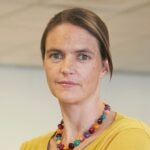Workshop Day 1
Welcome & Introduction
Yonatan Grad ear ned his MD and PhD at Harvard Medical School, trained in internal medicine at BWH and infectious diseases at BWH and Massachusetts General Hospital, and did his research fellowship in the CCDD with Marc Lipsitch. The Grad Lab investigates how pathogens evolve and spread using a combination of genomics, microbiology, mathematical modeling, and epidemiological tools, and includes projects studying outbreaks in collaboration with hospitals and public health institutions and the biology and epidemiology that underlies the emergence and spread of antibiotic resistance.
ned his MD and PhD at Harvard Medical School, trained in internal medicine at BWH and infectious diseases at BWH and Massachusetts General Hospital, and did his research fellowship in the CCDD with Marc Lipsitch. The Grad Lab investigates how pathogens evolve and spread using a combination of genomics, microbiology, mathematical modeling, and epidemiological tools, and includes projects studying outbreaks in collaboration with hospitals and public health institutions and the biology and epidemiology that underlies the emergence and spread of antibiotic resistance.
Keynote (Virtual)
 Bisola Ojikutu MD MPH is a nationally recognized physician leader, health equity researcher, community advocate and expert in the prevention, care, and treatment of infectious diseases. Dr. Ojikutu was appointed Executive Director of the Boston Public Health Commission (BPHC) in July 2021.
Bisola Ojikutu MD MPH is a nationally recognized physician leader, health equity researcher, community advocate and expert in the prevention, care, and treatment of infectious diseases. Dr. Ojikutu was appointed Executive Director of the Boston Public Health Commission (BPHC) in July 2021.
As Executive Director of the BPHC, the City’s health department and Commissioner of Public Health for the City of Boston, Dr. Ojikutu manages a budget of $180M and leads more than 1,300 employees working in 6 bureaus and more than 40 programs. Dr. Ojikutu is a key advisor to Boston’s Mayor on health issues and builds innovative partnerships across city departments and within Boston’s communities to positively impact the health of all city residents. Among other public health priorities, she is committed to addressing racism as a public health crisis and advancing health equity.
Dr. Ojikutu is an Associate Professor of Medicine at Harvard Medical School and a faculty member within the Division of Global Health Equity at Brigham and Women’s Hospital. She also holds an appointment within the Infectious Disease Division at Massachusetts General Hospital and is an adjunct faculty member at The Fenway Institute. She has led research and developed programs focused on increasing access to health care among marginalized populations funded by the National Institutes of Health, the Patient Centered Outcomes Research Institute and the Health Resources and Services Administration (HIV/AIDS Bureau). Most recently, Dr. Ojikutu served as Director of the Community Engaged Research Program and the Associate Director of the Bio-Behavioral and Community Science Core for the Harvard Center for AIDS Research. She is widely published in peer-reviewed journals and is an Associate Editor for the American Journal of Public Health (AJPH). She is also a co-editor of two comprehensive textbooks detailing strategies to address the ongoing HIV epidemic with Black and Latinx communities, HIV in US Communities of Color. Among other awards, she was named one of the 100 Most Influential Bostonians by Boston Magazine in 2022.
Dr. Ojikutu also has significant international experience. As a Senior Advisor at John Snow Inc, Dr. Ojikutu directed a $30 million project that provided program management, strategic planning and technical assistance to improve HIV care and treatment to 15 countries in sub-Saharan Africa and Latin America. She is also the former Director of the Office of International Programs at Harvard Medical School.
Dr. Ojikutu graduated from Johns Hopkins School of Medicine. She completed internal medicine residency at New York Presbyterian Hospital-Cornell and Infectious Disease Fellowship at Massachusetts General/Brigham and Women’s Hospital. She is a former Commonwealth Fund Fellow in Minority Health Policy and has a Master’s in Public Health in Health Policy and Management from the Harvard School of Public Health. She is board certified in internal medicine and infectious diseases and is a Fellow of the Infectious Disease Society of America
Lecture 1: Introduction to SIR Modeling

Kirstin Roster is a postdoctoral fellow in the lab of Yonatan Grad, where she develops mathematical and statistical models of infectious disease transmission and genomic surveillance strategies. She holds a PhD in Computational Mathematics from the University of São Paulo, an MPP from Georgetown University, and a BSc in Mathematics and Philosophy from the University of York. Prior to her PhD studies, Kirstin was a data scientist at the World Bank Group and has worked on international development projects in Latin America, Sub-Saharan Africa, and Asia.
Breakout session 1: Introduction to SIR Models in R

Léa Cavalli is a 3rd Year PhD student in Infectious Disease Epidemiology at the Harvard School of Public Health. Her advisor is Dr. William Hanage and her research focuses on leveraging genomic data to understand to ecology and evolution of pathogens, notably in response to clinical interventions.

Beau Schaeffer is a second year PhD student studying infectious disease epidemiology under the mentorship of Dr. Bill Hanage. He holds a B.S. in Microbiology from The University of Alabama and an S.M. in Epidemiology from the Harvard Chan School. Currently, his research interests include exploring pathogen evolution at the within-host and population level as well as applying causal inference methods to infectious disease problems.
Career Panel
Moderator:

Eva Rumpler is a PhD student in Population Health Sciences concentrating in infectious disease epidemiology, advised by Dr. Marc Lipsitch. She previously graduated from the Master of Science in infectious disease epidemiology at the Harvard T.H. Chan School of Public Health and worked at CCDD as a research assistant on COVID-19 modelling projects. Prior to coming to Harvard, she studied public policy and global health at SciencesPo and biology at Sorbonne University and Ecole Normale Supérieure in Paris.
Panelists:
 Aishani Aatresh is a senior at Harvard College and is in the Grad and Lipsitch Labs, interested broadly on questions of preparedness in infectious diseases. She works on modeling within-host kinetics of SARS-CoV-2, CRISPR-Cas13-based diagnostic testing for antibiotic susceptibility in Neisseria gonorrhoeae, and understanding the role of viral discovery in zoonotic hosts in outbreak preparedness and response. Aishani previously focused on seroprevalence studies and rapid antigen testing in the Michael Mina Lab and has also worked in biotech and penned a variety of science writing pieces. She is pursuing a degree of her own design called Complex Biosocial Systems at the College and is a Fellow in the Program on Science, Technology and Society at the Harvard Kennedy School. Next year, she will be pursuing a Master’s in Nature, Society and Environmental Governance at the University of Oxford as a Rhodes Scholar.
Aishani Aatresh is a senior at Harvard College and is in the Grad and Lipsitch Labs, interested broadly on questions of preparedness in infectious diseases. She works on modeling within-host kinetics of SARS-CoV-2, CRISPR-Cas13-based diagnostic testing for antibiotic susceptibility in Neisseria gonorrhoeae, and understanding the role of viral discovery in zoonotic hosts in outbreak preparedness and response. Aishani previously focused on seroprevalence studies and rapid antigen testing in the Michael Mina Lab and has also worked in biotech and penned a variety of science writing pieces. She is pursuing a degree of her own design called Complex Biosocial Systems at the College and is a Fellow in the Program on Science, Technology and Society at the Harvard Kennedy School. Next year, she will be pursuing a Master’s in Nature, Society and Environmental Governance at the University of Oxford as a Rhodes Scholar.

Caroline Buckee is a Professor of Epidemiology at Harvard T.H. Chan School of Public Health. Her work is focused on understanding the mechanisms driving the spread of infectious diseases that impact the most vulnerable populations worldwide, particularly malaria. Before coming to Harvard, Dr. Buckee completed a D.Phil. at the University of Oxford, and Omidyar and Wellcome Trust fellowships at the Santa Fe Institute and the Kenya Medical Research Institute, respectively, where she analyzed malaria parasite evolution and epidemiology. Dr. Buckee’s group uses a range of mathematical models, experimental and genomic data, and “Big Data” from mobile phones and satellites to understand how human pathogens spread and may be controlled. Her work has appeared in high profile scientific journals such as Science and PNAS, as well as being featured in the popular press, including CNN, The New Scientist, Voice of America, NPR, and ABC. Dr. Buckee was featured as one of MIT Tech Review’s 35 Innovators Under 35, a CNN Top 10: Thinker, and Foreign Policy Magazine’s 100 Global Thinkers.
 Angela Fowler, MD, MPH, currently serves as the Associate Medical Director for Vaccine Preventable Diseases in the Office of the Medical Director, Bureau for Infectious Disease and Laboratory Sciences at the Massachusetts Department of Public Health. Dr. Fowler is an honors graduate of Brown University and Harvard Medical School. She performed her Internal Medicine Residency at Massachusetts General Hospital and a Preventive Medicine Residency at the University of North Carolina at Chapel Hill, where she also received a master’s degree in public health. Her career has been multi-faceted including clinical work in multiple settings, research, and community service. She has been a grant-funded researcher in the area of obesity medicine and the study of leptin. She has been a primary care provider in the US Air Force, Beth Israel Deaconess Medical Center, and provided university medical services at MIT Health. At the Bureau of Infectious Disease and Laboratory Sciences, Dr. Fowler offers clinical oversight in activities related to vaccination and vaccine preventable diseases throughout the bureau. She provides consultation for vaccine preventable diseases and outbreak management and medical direction of the perinatal Hepatitis B program, consultation for the MIIS, and teaching and outreach with providers, provider groups, and the general public. She supports the increasingly critical task of promoting vaccine confidence and combatting vaccine misinformation. Throughout her career as clinician, teacher, and researcher, she has been a strong advocate for immunization and health equity.
Angela Fowler, MD, MPH, currently serves as the Associate Medical Director for Vaccine Preventable Diseases in the Office of the Medical Director, Bureau for Infectious Disease and Laboratory Sciences at the Massachusetts Department of Public Health. Dr. Fowler is an honors graduate of Brown University and Harvard Medical School. She performed her Internal Medicine Residency at Massachusetts General Hospital and a Preventive Medicine Residency at the University of North Carolina at Chapel Hill, where she also received a master’s degree in public health. Her career has been multi-faceted including clinical work in multiple settings, research, and community service. She has been a grant-funded researcher in the area of obesity medicine and the study of leptin. She has been a primary care provider in the US Air Force, Beth Israel Deaconess Medical Center, and provided university medical services at MIT Health. At the Bureau of Infectious Disease and Laboratory Sciences, Dr. Fowler offers clinical oversight in activities related to vaccination and vaccine preventable diseases throughout the bureau. She provides consultation for vaccine preventable diseases and outbreak management and medical direction of the perinatal Hepatitis B program, consultation for the MIIS, and teaching and outreach with providers, provider groups, and the general public. She supports the increasingly critical task of promoting vaccine confidence and combatting vaccine misinformation. Throughout her career as clinician, teacher, and researcher, she has been a strong advocate for immunization and health equity.

Keya Joshi is an Associate Director of Health Economics and Outcomes Research (HEOR) for Infectious disease model and supports global evidence generation for Moderna’s respiratory platform. Prior to joining Moderna Keya completed her PhD in May 2023 focusing on infectious disease epidemiology from Harvard TH Chan School of Public Health. Her dissertation focused on the comparative performance of different vaccination strategies for COVID-19 and Influenza and strategies to improve parameterization of infectious disease models. In addition to her work on COVID-19 and flu, she has also worked on epidemiologic studies for Ebola, Measles, Tuberculosis, and RSV. Additionally, she holds a MHS in Infectious Disease Epidemiology from Johns Hopkins Bloomberg School of Public Health and a Degree in Public Health Studies from Johns Hopkins University.

Sylvia Ofori is a postdoc at the Center for Communicable Disease Dynamics, Harvard Chan School of Public Health. She has a background in community pharmacy, global health, digital health, and infectious disease modeling. In addition to working on Rwanda-based mathematical modeling training, she organizes a journal club for public health professionals to discuss trends in mathematical modeling studies. Her current research projects include evidence synthesis using systematic reviews and meta-analysis and a qualitative study to understand motivations, facilitators, and challenges to bridge the gap between mathematical modeling research and policy.
Lecture 2: Wastewater Epidemiology
 QinQin Yu is a Postdoctoral Fellow interested in understanding how and why pathogens evolve, what effect this has for disease spread, and what interventions can slow the spread of disease. Her current work is on the evolutionary dynamics of N. gonorrhoeae in response to pressures from the host adaptive immune system and equity in wastewater monitoring. QinQin completed her PhD in biophysics at UC Berkeley where she studied the role of spatial structure and stochasticity in microbial evolution. She completed her undergraduate degree in experimental physics at MIT. Outside of research, QinQin has interests in policy, education, and science communication. Her previous policy work includes assessing the progress of countries’ national actional plans on antimicrobial resistance in sub-Saharan Africa with the Center for Disease Dynamics Economics and Policy (now the One Health Trust). Before starting her PhD, she spent one developing an affordable science teaching lab model in Rwanda with the university program Kepler. Outside of work she enjoys hiking, traveling, food, and music.
QinQin Yu is a Postdoctoral Fellow interested in understanding how and why pathogens evolve, what effect this has for disease spread, and what interventions can slow the spread of disease. Her current work is on the evolutionary dynamics of N. gonorrhoeae in response to pressures from the host adaptive immune system and equity in wastewater monitoring. QinQin completed her PhD in biophysics at UC Berkeley where she studied the role of spatial structure and stochasticity in microbial evolution. She completed her undergraduate degree in experimental physics at MIT. Outside of research, QinQin has interests in policy, education, and science communication. Her previous policy work includes assessing the progress of countries’ national actional plans on antimicrobial resistance in sub-Saharan Africa with the Center for Disease Dynamics Economics and Policy (now the One Health Trust). Before starting her PhD, she spent one developing an affordable science teaching lab model in Rwanda with the university program Kepler. Outside of work she enjoys hiking, traveling, food, and music.
 Mary Bushman is an instructor in the Department of Epidemiology at the Harvard T.H. Chan School of Public Health. Mary has a B.A. in Mathematics from Carleton College and a Ph.D. in Population Biology, Ecology and Evolution from Emory University, and worked as a postdoctoral fellow with Rustom Antia at Emory University and then with Bill Hanage in the Center for Communicable Disease Dynamics at HSPH. While at Harvard, Mary pursued an interest in teaching as an HSPH Pedagogy Fellow and subsequently transitioned to an instructor role, in which they teach classes in infectious disease epidemiology in addition to conducting research as a member of Bill Hanage’s group. In their research, they are interested in how within-host dynamics and epidemiological dynamics interact to shape pathogen evolution, with recent work focusing on the role of immune selection on the spread of immune-escape variants of SARS-CoV-2.
Mary Bushman is an instructor in the Department of Epidemiology at the Harvard T.H. Chan School of Public Health. Mary has a B.A. in Mathematics from Carleton College and a Ph.D. in Population Biology, Ecology and Evolution from Emory University, and worked as a postdoctoral fellow with Rustom Antia at Emory University and then with Bill Hanage in the Center for Communicable Disease Dynamics at HSPH. While at Harvard, Mary pursued an interest in teaching as an HSPH Pedagogy Fellow and subsequently transitioned to an instructor role, in which they teach classes in infectious disease epidemiology in addition to conducting research as a member of Bill Hanage’s group. In their research, they are interested in how within-host dynamics and epidemiological dynamics interact to shape pathogen evolution, with recent work focusing on the role of immune selection on the spread of immune-escape variants of SARS-CoV-2.
Closing
 Marc Lipsitch is Professor of Epidemiology and founding Director of the Center for Communicable Disease Dynamics at Harvard TH Chan School of Public Health. He is on loan to CDC where he is Director of Science for the Center for Forecasting and Outbreak Analytics. His research focuses broadly on the impact of medical and public health interventions on pathogen populations and the consequences of these changes for human health. In particular his work has focused on pandemic preparedness and response, mathematical modeling of prevention trials, genomic epidemiology, and the sources of diversity in pathogen populations. Pathogens of specific interest include antimicrobial-resistant pathogens, Streptococcus pneumoniae, influenza, and SARS-CoV-2. On SARS-CoV-2, his work with CCDD and more recently CDC has included modeling of the epidemic trajectory, estimates of introduced cases by travelers, studies of clinical outcomes and severity, epidemiological and modeling methodology, vaccine allocation modeling, vaccine effectiveness studies, research ethics (related to human challenge trials), and other topics. He received a BA in philosophy from Yale and a DPhil in zoology from the University of Oxford, followed by postdoctoral work in biology at Emory University and a period as a visiting scientist at CDC, before joining Harvard Chan.
Marc Lipsitch is Professor of Epidemiology and founding Director of the Center for Communicable Disease Dynamics at Harvard TH Chan School of Public Health. He is on loan to CDC where he is Director of Science for the Center for Forecasting and Outbreak Analytics. His research focuses broadly on the impact of medical and public health interventions on pathogen populations and the consequences of these changes for human health. In particular his work has focused on pandemic preparedness and response, mathematical modeling of prevention trials, genomic epidemiology, and the sources of diversity in pathogen populations. Pathogens of specific interest include antimicrobial-resistant pathogens, Streptococcus pneumoniae, influenza, and SARS-CoV-2. On SARS-CoV-2, his work with CCDD and more recently CDC has included modeling of the epidemic trajectory, estimates of introduced cases by travelers, studies of clinical outcomes and severity, epidemiological and modeling methodology, vaccine allocation modeling, vaccine effectiveness studies, research ethics (related to human challenge trials), and other topics. He received a BA in philosophy from Yale and a DPhil in zoology from the University of Oxford, followed by postdoctoral work in biology at Emory University and a period as a visiting scientist at CDC, before joining Harvard Chan.
Workshop Day 2
Lecture 3: Science Communication
 C. Brandon Ogbunu is an Assistant Professor in the Department of Ecology and Evolutionary Biology at Yale University, and an External Professor at the Santa Fe Institute. He is a computational biologist whose research investigates complex problems in epidemiology, biomedicine, genetics, and evolution. In addition, he operates a research program at the intersection between science, society, and culture. In this realm, he asks questions about the relationship between scientific discovery and social phenomena. He is currently a contributing writer at Quanta Magazine and WIRED, and has written for multiple other magazines, including Scientific American, Undark, and The Atlantic. He was featured on the Emmy Award-winning web series Finding Your Roots: The Seedlings, and has been featured in several other media venues, including WNYC”s RadioLab and MIT News.
C. Brandon Ogbunu is an Assistant Professor in the Department of Ecology and Evolutionary Biology at Yale University, and an External Professor at the Santa Fe Institute. He is a computational biologist whose research investigates complex problems in epidemiology, biomedicine, genetics, and evolution. In addition, he operates a research program at the intersection between science, society, and culture. In this realm, he asks questions about the relationship between scientific discovery and social phenomena. He is currently a contributing writer at Quanta Magazine and WIRED, and has written for multiple other magazines, including Scientific American, Undark, and The Atlantic. He was featured on the Emmy Award-winning web series Finding Your Roots: The Seedlings, and has been featured in several other media venues, including WNYC”s RadioLab and MIT News.
Lecture 4: Measuring and Modeling Human Mobility for Infectious Disease Control

Caroline Buckee (see full bio above)
Breakout Session 3: Outbreak Scenario
 QinQin Yu (see full bio above)
QinQin Yu (see full bio above)

Sylvia Ofori (see full bio above)
Lecture 5: Machine Learning & Novel Data Sources
 Mauricio Santillana, PhD, MSc is the director of the Machine Intelligence Research Lab in the Network Science Institute. He is a Professor in the Physics and Electrical and Computer Engineering Departments at Northeastern University. Mauricio enjoys working with public health officials and clinicians in the design of decision-making support tools by leveraging Internet-based data sources such as Electronic Health Records, Bedside Monitors, Google search trends, Twitter microblogs, News Alerts, Weather, and Human Mobility.Mauricio is a physicist and applied mathematician with expertise in mathematical modeling and scientific computing. He has worked in multiple research areas frequently analyzing big data sets to understand and predict the behavior of complex systems. His research modeling population growth patterns has informed policy makers in Mexico and Texas. His research in numerical analysis and computational fluid dynamics has been used to improve models of coastal floods, and to improve the performance of global atmospheric chemistry models. In recent years, his main interest has been to develop mathematical models to improve healthcare. Mauricio received a B.S. in physics with highest honors from the Universidad Nacional Autonoma de Mexico in Mexico City, and a master’s and PhD in computational and applied mathematics from the University of Texas at Austin. Mauricio first joined Harvard as a postdoctoral fellow at the Harvard Center for the Environment and has been a lecturer in applied mathematics at the Harvard SEAS, receiving two awards for excellence in teaching.
Mauricio Santillana, PhD, MSc is the director of the Machine Intelligence Research Lab in the Network Science Institute. He is a Professor in the Physics and Electrical and Computer Engineering Departments at Northeastern University. Mauricio enjoys working with public health officials and clinicians in the design of decision-making support tools by leveraging Internet-based data sources such as Electronic Health Records, Bedside Monitors, Google search trends, Twitter microblogs, News Alerts, Weather, and Human Mobility.Mauricio is a physicist and applied mathematician with expertise in mathematical modeling and scientific computing. He has worked in multiple research areas frequently analyzing big data sets to understand and predict the behavior of complex systems. His research modeling population growth patterns has informed policy makers in Mexico and Texas. His research in numerical analysis and computational fluid dynamics has been used to improve models of coastal floods, and to improve the performance of global atmospheric chemistry models. In recent years, his main interest has been to develop mathematical models to improve healthcare. Mauricio received a B.S. in physics with highest honors from the Universidad Nacional Autonoma de Mexico in Mexico City, and a master’s and PhD in computational and applied mathematics from the University of Texas at Austin. Mauricio first joined Harvard as a postdoctoral fellow at the Harvard Center for the Environment and has been a lecturer in applied mathematics at the Harvard SEAS, receiving two awards for excellence in teaching.
Breakout Session 3: Forecasting

Nicole Kogan is completing her PhD in infectious disease epidemiology at the Harvard T. H. Chan School of Public Health, working with Dr. Mauricio Santillana. Her research is centered on leveraging digital data sources (e.g., social media) to improve surveillance of emerging infectious diseases. She has also spent 5 years working in biotech and pharma. Nicole received her bachelor’s degree in bioengineering from MIT. In her free time, she is an avid fencer and loves cooking recipes written in other languages.
Breakout Session 4: Back of the Envelope Calculations in R
 Katherine Jia is a PhD student in Population Health Sciences concentrating in infectious disease epidemiology. Her research interests are in using surveillance data to infer epidemic intensity and evaluation impact of infectious disease interventions. Prior to coming to CCDD, she was trained in epidemiology in Hong Kong and in the United Kingdom, and worked as a research assistant in Imperial College London.
Katherine Jia is a PhD student in Population Health Sciences concentrating in infectious disease epidemiology. Her research interests are in using surveillance data to infer epidemic intensity and evaluation impact of infectious disease interventions. Prior to coming to CCDD, she was trained in epidemiology in Hong Kong and in the United Kingdom, and worked as a research assistant in Imperial College London.
 Emmanuelle Dankwa is an infectious disease epidemiologist and statistician. Emmanuelle’s current research concerns the design of mathematical tools (known as models) for understanding the spread of multidrug-resistant tuberculosis (MDR-TB). MDR-TB is TB resistant to (at least) isoniazid and rifampin, the two most potent anti-TB drugs, and is a major global health concern. Her work aims to provide evidence for the formulation of control policies against MDR-TB. She is also involved in efforts, led by the Center for Communicable Disease Dynamics (CCDD), to develop capacity in infectious disease modeling in Africa. To this end, she contributes to the design and delivery of the UGHE (University of Global Health Equity, Rwanda)/Harvard training course in mathematical modeling of infectious disease transmission.
Emmanuelle Dankwa is an infectious disease epidemiologist and statistician. Emmanuelle’s current research concerns the design of mathematical tools (known as models) for understanding the spread of multidrug-resistant tuberculosis (MDR-TB). MDR-TB is TB resistant to (at least) isoniazid and rifampin, the two most potent anti-TB drugs, and is a major global health concern. Her work aims to provide evidence for the formulation of control policies against MDR-TB. She is also involved in efforts, led by the Center for Communicable Disease Dynamics (CCDD), to develop capacity in infectious disease modeling in Africa. To this end, she contributes to the design and delivery of the UGHE (University of Global Health Equity, Rwanda)/Harvard training course in mathematical modeling of infectious disease transmission.

Christopher Boyer is a postdoctoral research fellow in Marc Lipsitch’s lab at the Harvard T.H. Chan School of Public Health. With Marc he is modeling the viral kinetics of SARS-CoV-2 by combining data from serological and virological assays. He is also interested in applying modern causal methods to the study of infectious disease. His previous research spans several topics in epidemiology and the social sciences. He received a PhD in Epidemiology and an S.M. in Biostatistics from Harvard in 2023. Prior to that he worked at Innovations for Poverty Action, where he designed and ran large scale randomized controlled trials of public health interventions. He holds an MPH in Epidemiology from Columbia University and a BS in Mechanical Engineering from Wright State University.
Pre-Workshop
Introductory Training Session in R (via Zoom)
 Jess Kerr is a researcher in the Public Health Dynamics Lab at the University of Pittsburgh in the final stages of completing her PhD in Epidemiology. Her research focuses on modeling seasonal respiratory viruses as well as MPOX and other emerging infectious disease threats. She received both her BA and MPH from the University of Pittsburgh in Anthropology and Infectious Diseases and Microbiology, respectively. Jess is frequently interrupted on Zoom calls by her toy poodle and black cat, so do not be surprised if you end up seeing them at any point.
Jess Kerr is a researcher in the Public Health Dynamics Lab at the University of Pittsburgh in the final stages of completing her PhD in Epidemiology. Her research focuses on modeling seasonal respiratory viruses as well as MPOX and other emerging infectious disease threats. She received both her BA and MPH from the University of Pittsburgh in Anthropology and Infectious Diseases and Microbiology, respectively. Jess is frequently interrupted on Zoom calls by her toy poodle and black cat, so do not be surprised if you end up seeing them at any point.
Co-organizer, MIDAS Coordination Center, University of Pittsburgh
 Harry Hocheiser is an Associate Professor of Biomedical Informatics, the Intelligent Systems Program, and the Clinical and Translational Science Institute at the University of Pittsburgh, where he also serves as Director of the Biomedical Informatics Training Program. Dr. Hochheiser studied Computer Science at MIT and the University of Maryland, where he focused on Human-Computer Interaction and Information Visualization. His recent research focuses on the use of data science, informatics, machine learning, and a combination of quantitative and qualitative techniques to make biomedical data more useful for clinicians and researchers. Since 2021, Dr. Hochheiser has been the Director of the Models of Infectious Disease Agent Study (MIDAS) Coordination Center, an NIH funded center designed to provide informatics and support services to a worldwide community of several hundred infectious disease researchers.
Harry Hocheiser is an Associate Professor of Biomedical Informatics, the Intelligent Systems Program, and the Clinical and Translational Science Institute at the University of Pittsburgh, where he also serves as Director of the Biomedical Informatics Training Program. Dr. Hochheiser studied Computer Science at MIT and the University of Maryland, where he focused on Human-Computer Interaction and Information Visualization. His recent research focuses on the use of data science, informatics, machine learning, and a combination of quantitative and qualitative techniques to make biomedical data more useful for clinicians and researchers. Since 2021, Dr. Hochheiser has been the Director of the Models of Infectious Disease Agent Study (MIDAS) Coordination Center, an NIH funded center designed to provide informatics and support services to a worldwide community of several hundred infectious disease researchers.
